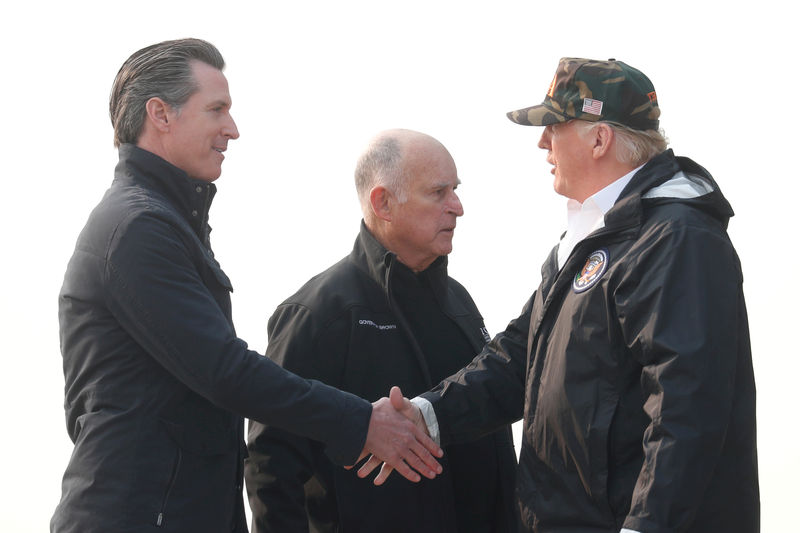By David Shepardson
WASHINGTON (Reuters) - U.S. President Donald Trump confirmed on Wednesday the Environmental Protection Agency will revoke California's authority to require automakers to build cleaner vehicles than federal requirements demand - a decision that will set off a massive legal battle.
It marks the latest move in the Trump administration's multipronged attack on California's efforts to reduce vehicle emissions and could reshape the mix of vehicles driven by Americans for years. The announcement will not immediately lead to revised emissions requirements, but the Trump administration plans to announce this autumn a separate rule to dramatically roll back Obama-era fuel-efficiency standards.
Trump, who is in California this week, urged automakers to back the action, but so far none have publicly supported revocation of California's authority. "Automakers should seize this opportunity because without this alternative to California, you will be out of business," Trump wrote on Twitter.
California Governor Gavin Newsom said the decision was "a continuation of a political vendetta against California and our progress." But he said would win in court. "We will prevail," he said at a news conference in Sacramento.
The Alliance of Automobile Manufacturers, a trade group representing General Motors Co (NYSE:GM), Toyota Motor Corp, Volkswagen AG (DE:VOWG_p), Ford Motor (NYSE:F) Co and others, declined to take a position on Trump's revocation of California's waiver, saying automakers will review the decision "to get the full picture of how this impacts automakers, our workers and our customers."
The EPA and U.S. Transportation Department plan to announce on Thursday that the government is revoking an EPA waiver California received in 2013 to set state emissions rules and will hold a news conference at 8 a.m. EDT to discuss the decision.
The Trump administration will argue that barring California from setting its own stricter rules will provide automakers with regulatory certainty and also argue that the lower emissions standards will reduce the future price of vehicles. Environmental groups contend Americans will spend more in fuel costs than they would save in upfront costs.
In addition to auto emissions, the Trump administration and California have already locked horns over high-speed rail funding, border wall funding and immigration regulations. Trump has also moved to roll back other Obama-era climate change regulations.
The move, which will also include the Transportation Department declaring California is pre-empted from regulating vehicle fuel economy, will spark legal challenges over issues including states' rights and climate change that administration could ultimately be decided by the U.S. Supreme Court.
Trump met with senior officials last Thursday and agreed to green-light the plan to bar California from setting tailpipe emission standards that are followed by a dozen other states or requiring a rising number of zero-emission vehicles, Reuters reported last week.
Sierra Club Executive Director Michael Brune said the environmental group would file suit to challenge the move, calling it "nothing more than pure vindictiveness from an administration set on giving Big Oil a polluting pass at the expense of our climate and the well-being of American families."
Democrats sharply criticized the decision. "Higher auto emission standards make the air we all breathe cleaner, keep us healthier - and keep our auto industry competitive in the global marketplace," Democratic presidential hopeful Joe Biden said.
Under Trump, federal regulators have backed freezing emissions requirements for new cars and trucks at 2020 levels through 2026. Administration officials say the final regulation will include a modest boost in annual efficiency requirements but far less than what the Obama administration set in 2012. At the time, California agreed to adopt the Obama rules rather than set its own standards.
The Obama-era rules called for a fleetwide fuel efficiency average of 46.7 miles (75 km) per gallon by 2025, with average annual increases of about 5%, compared with 37 mpg by 2026 under the Trump administration’s preferred option to freeze requirements.
The Trump plan's preferred option would increase U.S. oil consumption by about 500,000 barrels per day by the 2030s but reduce automakers regulatory costs by more than $300 billion.

California wants 15.4% of vehicle sales by 2025 to be EVs or other zero-emission vehicles and 10 other states have adopted those requirements.